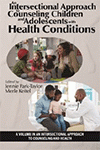
An Intersectional Approach to Counseling Children and Adolescents With Health Conditions
Edited by:
Jennie Park-Taylor, Fordham University
Merle Keitel, Fordham University
A volume in the series: An Intersectional Approach to Counseling and Health. Editor(s): Jennie Park-Taylor, Fordham University . Merle Keitel, Fordham University.
In Press 2024
The purpose of the present book, An Intersectional Approach to Counseling Children and Adolescents with Health Conditions, is to provide mental health professionals and students of counseling, medicine, psychology, social work, and other helping professions, with useful information and helpful suggestions for their work with children and adolescents who experience significant health issues. The chapter authors rely on an intersectional understanding of the human experience and specifically focus on how diverse youth experience, understand, and seek support for specific health conditions and illnesses.
Considering contemporary research that has shed light on some of the ways individuals’ multiple social identities interconnect and interact to compound experiences of illness, health psychology researchers would benefit from applying an intersectional lens in their explorations of the micro and macro-level variables that influence pathways towards health and illness for different groups. For mental health practitioners, an intersectional perspective on diverse children and adolescents’ experiences of specific health conditions will more likely lead to innovative and inclusive interventions that target change at multiple levels.
We are confident that our book will be of great use to mental health practitioners and students who plan to or are currently working with children and adolescents with significant health issues. Readers of the book can focus on a specific health condition that is common among children/adolescents and develop their knowledge, skills, and awareness of the cultural and systemic considerations in working with children/adolescents and their families. Particular attention can be paid to the ways in which the clients’ and the counselors’ intersectional social identities may influence counseling children and adolescents with significant health issues.
CONTENTS
Preface, Jennie Park-Taylor and Merle Keitel. Multidisciplinary Support for Diverse Youth Managing Type 2 Diabetes, Maria D. Theodorakakis, Mary E. Walsh, Quang D. Tran, and Ellen H. O’Donnell. Supporting Adjustment and Identity Development in Diverse Youth With Cancer: A Case of Osteosarcoma, Lauren Latella and Christina G. Salley. Anemia Through an Intersectional Lens, Mikaela Pitcan and Chrishane Cunningham. The Intersection of Asthma and Anxiety in Urban Minority Youth, Angela P. Vargas, Acklema Mohammad, and Rosa Agosto. Counseling Youth With Visual Impairment and Blindness, Amanda McKerracher, Mercedes Zapata, and Sarah Manchanda. An Intersectional Perspective on Counseling Adolescents With Polycystic Ovary Syndrome: The Case of a South Asian American Teen, Meera Aladin, Belkis Y. Martinez, and Ranjana Srinivasan. Counseling Food Allergic Children and Adolescents With Diverse Identities, Dori M. Polovsky and Caroline Southwick. Holistic Psychosocial Support for Youth With Dental Health Concerns, Sonia Sanchez, Jill Roche Gomez, Ivan E. Cornejo, Jennie Park-Taylor, and Nina Shen. Counseling Transracial Adoptee Youth With Health Conditions: A Case of Cleft Palate, Hannah M. Wing, Jennie Park-Taylor, and Jane Aronson. An Intersectional Understanding of Migration Trauma: A Case of Rumination Syndrome in an Adolescent Girl From Ecuador, Joshua M. Henderson, Carina Y. Chen, and Jennie Park-Taylor. Author Biographies.
-
Paperback979-8-88730-586-8
Web price: $45.04 (Reg. 52.99)
-
Hardcover979-8-88730-587-5
Web price: $80.74 (Reg. 94.99)
- eBook979-8-88730-588-2

- HEA046000 - HEALTH & FITNESS: Children's Health
- HEA039000 - HISTORY: Asia: General
- PSY004000 - PSYCHOLOGY: DEVELOPMENTAL: Child



